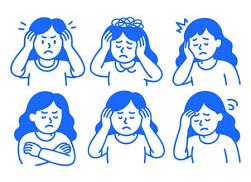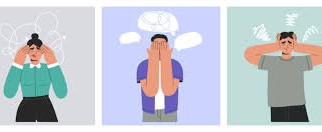Understanding and Managing Anxiety: Finding Calm in Everyday Life


What Is Anxiety and Why Does It Affect So Many People?
Anxiety is a common emotional state that everyone experiences at some point. But when feelings of worry or fear become constant and overwhelming, it turns into a problem that affects daily life. Many people live with ongoing tension, nervousness, or restlessness without fully understanding what causes it.
Some key points to understand:
- Anxiety often appears as excessive worry about ordinary things.
- It can cause both emotional and physical symptoms like sweating, trembling, or a fast heartbeat.
- It may be linked to stress, past trauma, or personal habits.
- It can interfere with relationships, work, and self-confidence.
Living with anxiety can feel like your mind is always on alert, even when there is no real danger. It becomes clear that anxiety is more than just stress—it’s an ongoing struggle that needs understanding and care.
How Does Anxiety Manifest in Daily Life?
Anxiety often hides behind normal activities, making it hard to recognize. People might assume they are just tired or stressed, but the signs go much deeper.
Common signs of anxiety include:
- Constant worrying, even about small issues.
- Avoiding situations or people that cause discomfort.
- Difficulty concentrating or making decisions.
- Trouble sleeping or relaxing even in quiet environments.
- Physical discomfort like stomach pain or muscle tension.
These symptoms can make daily tasks feel overwhelming, reducing the joy in ordinary moments. Understanding how anxiety shows itself helps people realize it’s not weakness—it’s a condition that can be managed with the right steps.
What Are the Main Causes of Anxiety?
The roots of anxiety are often complex, involving a mix of emotional, biological, and social factors. No single cause can explain it for everyone.
Some possible triggers include:
- Long-term stress from work, family, or finances.
- Past emotional trauma or painful experiences.
- Health problems that cause ongoing worry.
- Lack of rest, unhealthy diet, or substance use.
- Family history or inherited sensitivity to stress.
While the causes vary, the outcome is often the same—an uneasy mind that struggles to find peace. Recognizing what triggers anxiety is the first step to learning how to control it.
How Can Lifestyle Changes Help Reduce Anxiety?
While anxiety cannot always be eliminated, small changes in daily habits can make a big difference. These steps focus on balance, calm, and mental clarity.
Helpful lifestyle tips include:
- Practicing deep breathing and gentle physical activity like walking or yoga.
- Creating a routine that includes regular sleep and healthy meals.
- Reducing caffeine and alcohol, which may increase tension.
- Limiting exposure to stressful news or social media.
- Spending time outdoors or engaging in creative hobbies.
These actions help restore a sense of control and comfort in daily life. When a person builds healthy habits, the mind becomes stronger and calmer over time.
How Does Therapy Support People With Anxiety?
Talking therapies, such as counseling or cognitive behavioral techniques, help individuals identify patterns of thinking that increase worry. A supportive environment allows for emotional healing and better understanding of personal stress responses.
Therapeutic benefits include:
- Learning to replace negative thoughts with positive ones.
- Building coping strategies for real-life situations.
- Gaining confidence in handling social or emotional challenges.
- Understanding and releasing deep-rooted fears.
Therapy does not remove anxiety instantly, but it provides tools that make life easier to manage. Emotional support from a professional can be one of the most effective ways to heal from within.
How Can Medication Help When Anxiety Becomes Too Strong?
Sometimes, when anxiety severely affects daily functioning, professional care may include medication. These treatments are not for everyone but can help bring balance when emotional distress becomes too heavy to manage alone.
Medication may be considered when:
- Anxiety interrupts sleep or work performance.
- Physical symptoms are constant or intense.
- Other methods like relaxation and therapy are not enough.
- A doctor recommends additional support to stabilize emotions.
- Medical care aims to restore comfort and reduce the intensity of anxious thoughts. When used responsibly and under supervision, medication can help restore peace and normal functioning.
The Role of Buspar (Buspirone) in Managing Anxiety
Buspar, known by its active ingredient Buspirone, is often used to help individuals manage persistent anxiety. It works gradually, helping reduce tension and feelings of fear without creating dependence.
Key features of Buspar treatment:
- It helps balance brain chemicals that influence mood and calmness.
- It does not cause heavy drowsiness, allowing normal daily activity.
- It is suitable for long-term use under professional guidance.
- It can be combined with therapy for stronger results.
Buspar can bring back a sense of stability and help individuals face challenges with a clearer and calmer mind. When taken as part of a complete treatment plan, Buspar supports emotional recovery and renewed self-confidence.
Combining Buspar With a Holistic Anxiety Management Plan
For many people, medication alone is not enough. Combining Buspar with mindful lifestyle habits, healthy routines, and counseling often creates the best outcome.
A complete approach includes:
- Following the doctor’s guidance carefully.
- Continuing therapy to address emotional causes.
- Practicing relaxation techniques daily.
- Keeping a positive environment and staying socially connected.
- Blending medical and natural methods helps both the mind and body recover balance.
Long-term relief from anxiety comes from understanding oneself, following proper guidance, and staying consistent with treatment.
Finding Calm and Building a Peaceful Mind
Anxiety can be managed with patience, support, and care. Understanding its causes, recognizing the signs, and seeking the right balance of therapy, lifestyle change, and medical help can bring lasting peace. Healing is not about removing fear—it is about learning to live freely despite it.
Drug Description Sources: U.S. National Library of Medicine, Drugs.com, WebMD, Mayo Clinic, RxList
Reviewed and Referenced By:
- Dr. Alan Carter, PharmD – Clinical pharmacist with expertise in therapeutic pharmacology and patient safety. Frequently contributes to Drugs.com for reviewing medication use, dosage guidance, and safety updates.
- Dr. Emily Rhodes, MD – Board-certified psychiatrist and clinical researcher specializing in anxiety and mood disorders. Provides medical review input for the Mayo Clinic platform on mental health and pharmacologic care.
- Dr. Steven Wu, PhD – Pharmacology researcher affiliated with academic studies referenced by the U.S. National Library of Medicine, focusing on central nervous system agents and long-term treatment safety.
- Dr. Karen Mitchell, RN, MSN – Registered nurse and medical writer contributing to WebMD content related to patient education, emotional health, and medication adherence.
- Dr. Daniel Lopez, PharmD – Pharmacotherapy specialist often referenced on RxList for his clinical evaluations on drug interactions, side effects, and safe prescribing practices.
Article Post:Editorial Team of RXShop.md
(Updated at Oct 24 / 2025)

